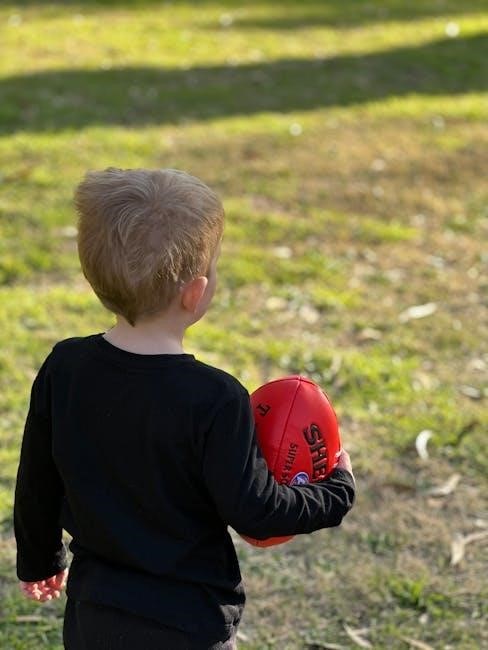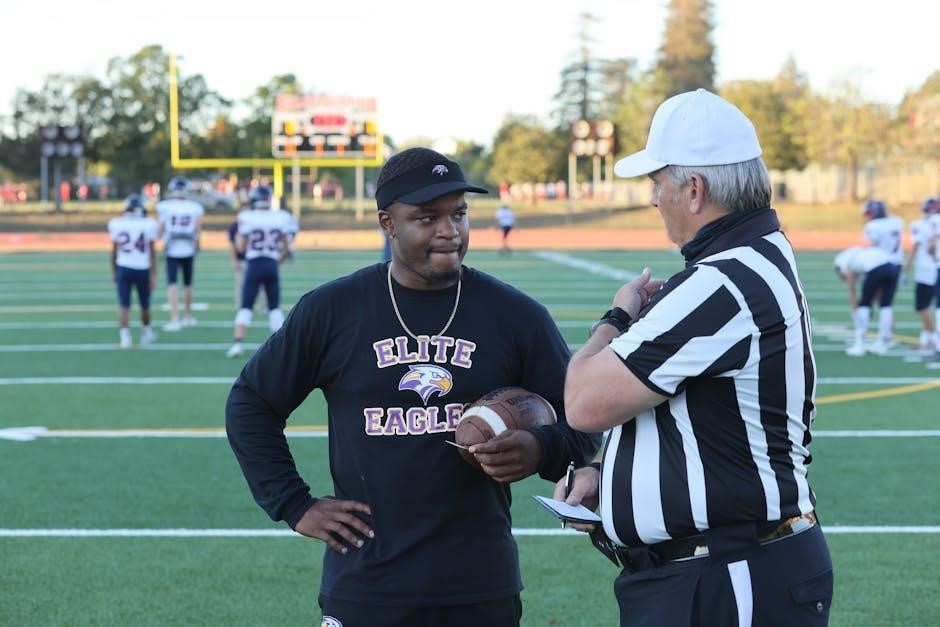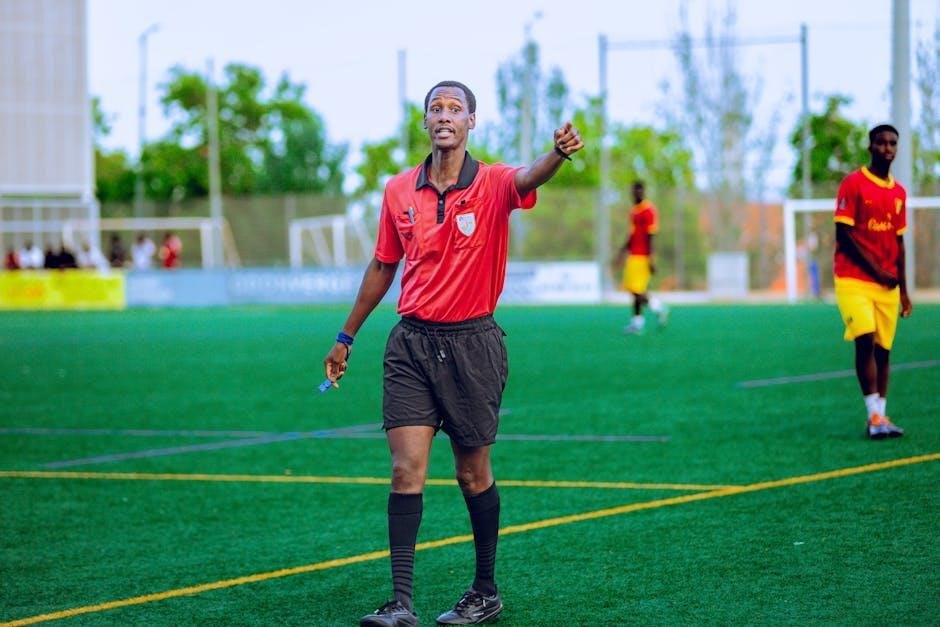The 2023 NFHS Football Rule Book provides updated guidelines for high school football, focusing on safety, penalty enforcement, and clarifications for officials and players․ Available in print and digital formats, it ensures consistency and fairness in gameplay nationwide․
Overview of the NFHS Football Rule Book
The 2023 NFHS Football Rule Book is the official guide for high school football, published by the National Federation of State High School Associations (NFHS)․ It outlines rules, regulations, and safety protocols to ensure fair and consistent gameplay․ The book covers player conduct, penalty enforcement, and equipment standards, with a focus on enhancing safety and sportsmanship․ Available in both print and digital formats, it is a essential resource for coaches, officials, and players; The NFHS updates the rule book annually to address emerging trends and improve the overall quality of high school football․ It is widely regarded as the definitive authority for the sport․
Importance of the Rule Book for High School Football
The 2023 NFHS Football Rule Book is vital for maintaining consistency, fairness, and safety in high school football․ It provides clear guidelines for gameplay, ensuring all teams operate under the same rules․ Coaches, officials, and players rely on it to understand expectations and protocols․ By standardizing rules, it reduces disputes and promotes sportsmanship․ The rule book also prioritizes player safety, addressing concussions and equipment standards․ Its implementation ensures a level playing field, fostering competitive and respectful games․ Without it, the integrity and safety of high school football would be compromised․ It is a cornerstone for the sport’s success and enjoyment․

Key Changes in the 2023 NFHS Football Rule Book
The 2023 NFHS Football Rule Book introduces key changes focusing on player safety, rule clarifications, penalty updates, and guidelines for assisting runners to enhance fair play and safety․
Rule Updates for Player Safety
The 2023 NFHS Football Rule Book prioritizes player safety with significant updates․ Prohibited contact now includes targeting defenseless players and leading with the helmet in tackles․ Concussion protocols are enhanced, requiring immediate removal of players showing symptoms․ Rules on blocking and tackling emphasize reducing head and neck injuries․ Additionally, stricter penalties for unsafe hits and clearer guidelines for Return-to-Play protocols aim to protect athletes․ These changes reflect a commitment to minimizing injury risks while maintaining the integrity of the game․
Changes in Penalty Enforcement
The 2023 NFHS Football Rule Book introduces notable changes in penalty enforcement to improve consistency and fairness․ A key update is the standardization of penalty enforcement procedures, ensuring uniformity across all games․ Automatic penalties for certain fouls, such as unsportsmanlike conduct, are now more strictly enforced․ Additionally, the rule book clarifies distinctions between live-ball and dead-ball fouls, affecting how penalties are applied․ Enforcement of penalties like pass interference and holding has been refined to reduce ambiguity․ These changes aim to enhance game flow while maintaining player safety and competitive balance, ensuring clearer expectations for teams and officials alike․
New Guidelines for Helping the Runner
The 2023 NFHS Football Rule Book introduces updated guidelines for assisting the runner, emphasizing fair play and sportsmanship․ These rules clarify when players or coaches can provide physical assistance to a runner, such as helping them up or adjusting equipment․ However, any action that interferes with play or provides an unfair advantage is now more strictly penalized․ For example, illegally helping a runner advance or continue play after a stoppage results in a penalty․ These changes aim to maintain the integrity of the game while ensuring player safety and promoting ethical conduct among participants․

Emphasis on Specific Rules in 2023
The 2023 NFHS Rule Book emphasizes key rule updates to enhance player safety, improve penalty enforcement, and clarify gameplay procedures for consistency and fair play this season․
Focus on Spot Penalty Enforcement
The 2023 NFHS Rule Book places a strong emphasis on accurate spot penalty enforcement to ensure fairness and consistency․ Officials are directed to meticulously mark and enforce penalties at the exact spot of the foul, eliminating guesswork․ This approach aims to reduce controversy and maintain the integrity of gameplay․ Specific attention is given to fouls like holding, offsides, and illegal blocks, with clear guidelines for measuring yardage and applying penalties․ Proper enforcement ensures equitable outcomes, fostering a balanced competitive environment․ This focus aligns with the broader goal of enhancing player safety and promoting fair play throughout the season․
Clarifications on Dead Ball Situations
The 2023 NFHS Rule Book provides detailed clarifications on dead ball situations to eliminate confusion․ A dead ball occurs when play stops due to a rule infraction or specific conditions, such as a incomplete pass or out-of-bounds․ Officials must signal a dead ball promptly and communicate the reason clearly․ New guidelines emphasize consistent handling of dead ball scenarios, including proper spotting and down counting․ Additionally, the rule book outlines specific procedures for restarting play after a dead ball, ensuring seamless transitions․ These clarifications help maintain game flow and minimize disputes, ensuring accurate and fair outcomes for all participants involved during competition․
Rules Regarding Obstruction and Blocking
The 2023 NFHS Rule Book clarifies rules on obstruction and blocking to enhance player safety and fair play․ Obstruction involves interfering with an opponent’s movement without possession of the ball, while blocking pertains to legally using hands or shoulders to engage opponents․ Key updates include stricter enforcement of illegal contact, such as blocking below the waist or from behind․ Additionally, passive blocking, where a player does not actively engage an opponent, is now more clearly defined․ These adjustments aim to reduce injuries and promote a safer, more competitive environment․ Officials are instructed to penalize violations rigorously, ensuring adherence to these critical rules during gameplay․

Safety Protocols in the 2023 Rule Book
The 2023 NFHS Rule Book emphasizes enhanced safety measures, including concussion return-to-play guidelines, stricter helmet safety standards, and updated heat management protocols to protect student-athletes․
Concussion Protocols and Return-to-Play Guidelines
The 2023 NFHS Football Rule Book includes updated concussion protocols to ensure player safety․ If a player shows concussion symptoms, they must be removed from play immediately․ A licensed medical professional must evaluate the player before returning to activity․ The rule book outlines a gradual return-to-play process, requiring players to progress through non-contact drills under medical supervision․ Coaches and officials are mandated to complete concussion education programs; These protocols aim to prevent long-term brain injury risks and ensure a safe environment for student-athletes․ Compliance with these guidelines is strictly enforced to prioritize player health and well-being throughout the season․
Helmets and Equipment Safety Standards
The 2023 NFHS Football Rule Book emphasizes strict safety standards for helmets and equipment to protect players from injury․ Helmets must meet NOCSAE certification requirements, and schools are required to ensure all equipment is properly fitted and maintained․ Annual inspections are mandated to verify compliance, and any non-compliant gear is prohibited․ Face masks, pads, and chin straps must adhere to specific guidelines to minimize injury risks․ The rule book also addresses prohibited equipment, such as helmets with excessive padding or modifications․ These standards aim to create a safer playing environment by ensuring all players use approved and well-maintained gear during games and practices․

Role of Officials and Referees
Officials and referees enforce rules, manage gameplay, and ensure player safety․ Their impartial decisions maintain fair play, while clear communication with coaches and players fosters a structured environment․
Duties and Responsibilities of Football Officials
Football officials are responsible for enforcing NFHS rules, ensuring fair play, and maintaining game order․ They inspect equipment, monitor player conduct, and interpret rules during contests․ Officials manage game timing, enforce penalties, and communicate decisions clearly․ Their role includes resolving disputes, ensuring safety protocols, and upholding sportsmanship․ Proper training and adherence to the rule book are essential for accurate decision-making․ Officials must remain impartial, focusing on game integrity and fostering a competitive yet respectful environment․ Their duties extend beyond refereeing, as they play a crucial role in educating players, coaches, and fans about rule applications and safety standards outlined in the 2023 NFHS Football Rule Book․
Training Requirements for High School Referees
High school referees must complete comprehensive training to enforce NFHS rules accurately․ This includes attending rules clinics, passing written exams, and participating in on-field mechanics sessions․ Training covers rules knowledge, game mechanics, and safety protocols․ Annual updates are required to stay current with rule changes․ Certification programs ensure referees meet national standards․ Training resources include rule books, online modules, and in-person workshops․ Practical experience and mentorship programs further enhance their skills, ensuring consistency and fairness in officiating․ This comprehensive approach supports player safety and maintains the integrity of high school football games․

Penalty Guidelines and Enforcement
The 2023 NFHS rule book outlines specific penalty guidelines, ensuring consistent enforcement of fouls․ Rules clarify penalty types, yardage assessments, and proper enforcement procedures during games․
Common Penalties and Their Enforcement
The 2023 NFHS rule book details common penalties, such as holding, offsides, and false starts, with specific enforcement guidelines․ Holding penalties result in a 10-yard loss, while offsides penalties are 5 yards․ False starts incur 5 yards, and pass interference is an automatic first down․ Unsportsmanlike conduct penalties include 15-yard losses and potential ejections․ Enforcement varies based on the foul’s severity and game impact․ Officials signal penalties, and coaches may challenge certain calls under specific rules․ Proper enforcement ensures fair play and player safety, aligning with the rule book’s emphasis on consistency and clarity in high school football games․
Unsportsmanlike Conduct and Ejections
The 2023 NFHS rule book strictly addresses unsportsmanlike conduct, including taunting, excessive celebrations, and disrespect toward officials or opponents․ Such actions result in a 15-yard penalty and may lead to ejection if severe or repeated․ Ejections are enforced for fighting, flagrant disrespect, or intentional contact with officials․ Coaches and players ejected must leave the premises immediately․ The rule book emphasizes maintaining sportsmanship and respect, reflecting the broader goals of high school athletics․ These guidelines ensure a safe and respectful environment, aligning with the NFHS commitment to fair play and student-athlete well-being․

Gameplay Rules and Interpretations
The 2023 NFHS rule book outlines essential gameplay rules, ensuring fair play and safety․ It covers downs, scoring, and penalties, maintaining the game’s integrity while prioritizing player well-being․
Rules Specific to Flag Football
The 2023 NFHS rule book includes specific guidelines for flag football, emphasizing safety and fair play․ Key rule updates involve field dimensions, game length, and player participation․ Flag football rules prohibit contact blocking and focus on pulling flags correctly․ Players must wear approved flags, and illegal flag removal penalties have been clarified․ The rule book also outlines procedures for restarting play after a flag is pulled and details unsportsmanlike conduct specific to flag football․ These adjustments ensure a fast-paced, exciting game while maintaining safety and sportsmanship standards for all participants․
Procedures for Game Delays and Stoppage
The 2023 NFHS rule book outlines clear procedures for managing game delays and stoppages․ Officials must follow specific protocols for weather-related stoppages, such as lightning delays, ensuring player safety․ Injured players must be attended to promptly, and games may be delayed until they are removed or cleared to continue․ Equipment issues, such as a lost ball or faulty gear, are addressed swiftly to minimize interruptions․ Communication between officials, coaches, and players is emphasized to maintain order during stoppages․ The rule book also provides guidance on restarting play fairly after delays, ensuring minimal disruption to the game flow while prioritizing safety and fairness․

Case Studies and Examples
The 2023 NFHS rule book includes real-world scenarios and examples to illustrate rule applications, helping officials, coaches, and players understand practical interpretations and decisions during gameplay․
Real-World Applications of the Rule Book
The 2023 NFHS Football Rule Book provides practical examples to guide officials, coaches, and players through real-game scenarios․ For instance, it clarifies how to enforce penalties like holding or offsides consistently․ Additionally, the rule book offers guidance on managing Dead Ball situations, ensuring fair play and player safety․ These examples help officials make accurate calls during high-pressure moments, such as determining pass interference or handling concussion protocols․ By applying these rules in actual games, the rule book ensures uniformity, fairness, and safety across all high school football competitions․ These real-world applications make the rule book an essential resource for everyone involved in the sport․
Controversial Calls and Their Rule-Based Outcomes
The 2023 NFHS Football Rule Book addresses controversial calls by providing clear rule interpretations to minimize disputes․ For example, the rule book clarifies pass interference criteria, ensuring consistency in enforcement․ Additionally, it outlines specific guidelines for targeting penalties, emphasizing player safety while reducing subjective calls․ The rule book also includes case studies, such as fumble vs․ incomplete pass rulings, to help officials make accurate decisions․ By adhering to these guidelines, officials can deliver rule-based outcomes, maintaining fairness and integrity in high-stakes situations․ These clarifications aim to reduce controversy and ensure uniform enforcement of rules across all high school football games․

Availability and Access to the Rule Book
The 2023 NFHS Football Rule Book is accessible in both print and digital formats, available through the NFHS website and authorized retailers, ensuring easy access for all․
How to Obtain the 2023 NFHS Football Rule Book
The 2023 NFHS Football Rule Book can be obtained through the National Federation of State High School Associations (NFHS) official website or authorized retailers․ The digital version, available as a downloadable PDF, provides instant access to updated rules and interpretations․ Visit the NFHS online store, navigate to the football section, and select the 2023 rule book option․ Print copies can also be purchased and shipped directly․ Additionally, state high school athletic associations often distribute the rule book to member schools․ Ensure authenticity by purchasing from NFHS or its approved partners to stay compliant with the latest regulations․
Digital and Print Formats of the Rule Book
The 2023 NFHS Football Rule Book is available in both digital and print formats to cater to different preferences and needs․ The digital version, provided as a downloadable PDF, is accessible via the NFHS website or authorized platforms; This format allows for easy navigation, keyword searches, and instant updates․ The print version is ideal for those who prefer a physical copy, offering a traditional reading experience․ Both formats contain the same comprehensive content, ensuring consistency and compliance with the latest rules․ Coaches, officials, and schools can choose the format that best suits their workflow and accessibility requirements․
Training and Resources for Coaches and Officials
The NFHS provides comprehensive training materials, including workshops, clinics, and online courses, to ensure coaches and officials master the 2023 rule book․ These resources include video tutorials, rule interpretation guides, and interactive quizzes to enhance understanding and practical application of the rules․ Officials can also access annual rule books, case books, and state-specific resources to stay updated and consistent in their decisions during games․
Workshops and Clinics for Rule Book Implementation
The NFHS offers regional and state-level workshops and clinics to educate coaches and officials on implementing the 2023 rule book effectively․ These sessions feature hands-on training, rule interpretations, and scenario-based discussions led by experienced instructors․ Topics include updates on player safety, penalty enforcement, and game procedures․ Attendees participate in interactive drills and Q&A segments to clarify rule applications․ Clinics also emphasize practical examples and real-game scenarios to ensure consistent rule enforcement․ These events are crucial for ensuring officials and coaches are well-prepared to apply the rules accurately during the season, promoting fairness and safety in high school football․
Online Resources for Rule Book Interpretation
The NFHS provides a variety of online resources to help interpret the 2023 football rule book․ Their official website offers downloadable PDFs, video tutorials, and webinars that break down complex rules․ Additionally, the NFHS offers an online rule book portal where users can search for specific rules and view interpretations․ Coaches and officials can access rule interpretation guides, case studies, and FAQs to clarify unclear situations․ Online forums and discussion groups are also available for sharing insights and asking questions․ These digital tools ensure that everyone involved in high school football can stay informed and up-to-date on rule interpretations․

Future of High School Football Rules
The NFHS continues to focus on safety advancements, technology integration, and rule modifications to enhance player well-being and improve gameplay fairness in future rule books annually․
Trends and Potential Changes in Upcoming Seasons
The NFHS is expected to continue prioritizing player safety and competitive balance in future rule books․ Potential changes may include modifications to kickoffs, punts, and blocking rules to reduce injuries․ Advances in technology, such as wearable devices for concussion detection, could become more prevalent․ Additionally, rules regarding equipment, particularly helmets, may evolve to meet stricter safety standards․ Officials may also see expanded roles in enforcing safety protocols․ Feedback from coaches, players, and officials will remain crucial in shaping updates․ The NFHS will likely focus on clarifying ambiguous rules to improve consistency and fairness in gameplay across all levels․
Technology’s Role in Rule Enforcement and Safety
Technology is increasingly influencing rule enforcement and safety in high school football․ Wearable devices now monitor head impacts, aiding concussion protocols․ Automated systems track down and distance, reducing human error․ Video review tools help officials analyze controversial plays․ Sensors in helmets and pads provide real-time safety data․ Electronic whistles and communication systems enhance referees’ accuracy․ The NFHS explores using technology to enforce rules consistently while maintaining game integrity․ These innovations aim to protect players and ensure fair gameplay, aligning with the rule book’s safety-focused objectives․ Technology’s integration is expected to expand, offering new ways to uphold rules and prioritize athlete well-being․
